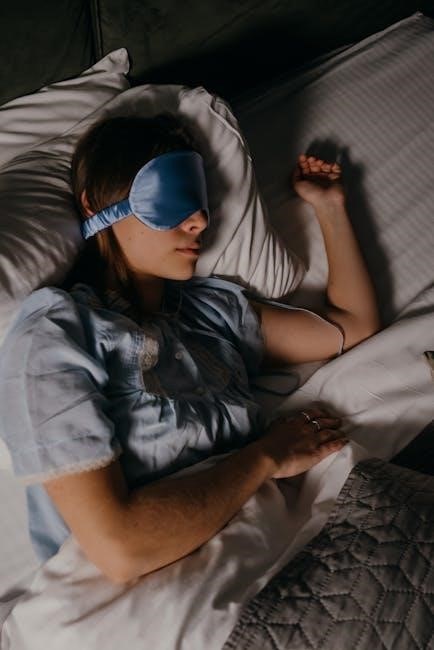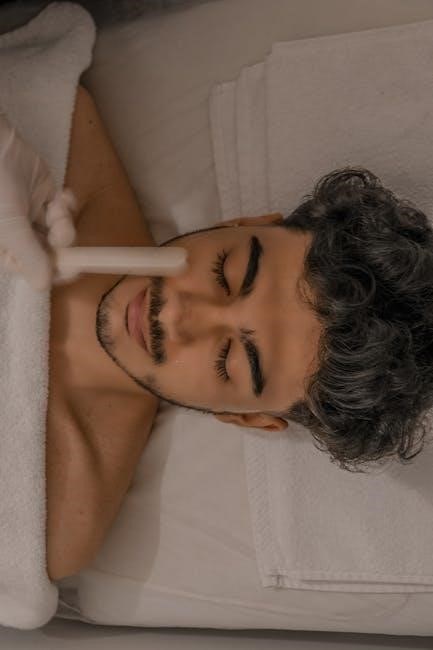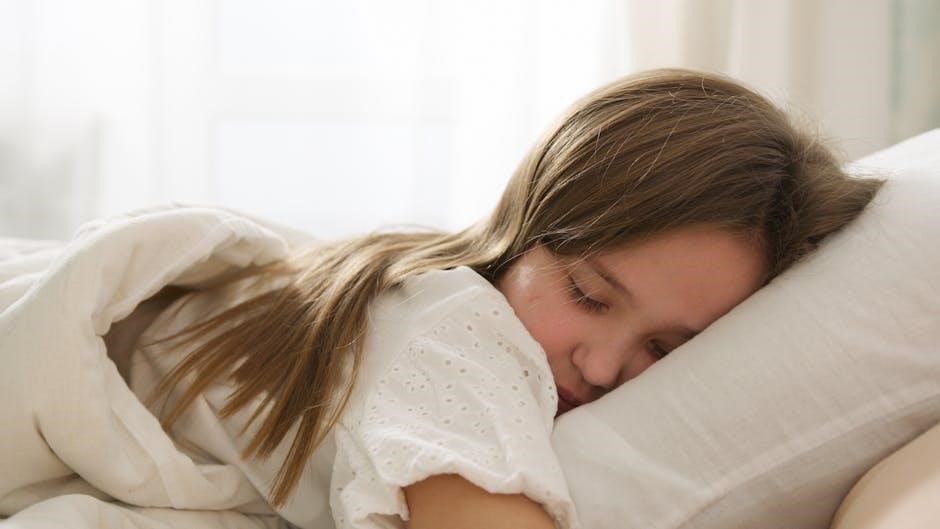Sleep hygiene refers to practices that improve sleep quality and duration. It involves maintaining consistent schedules, creating relaxing routines, and avoiding stimulants, promoting better rest and mental well-being.

What is Sleep Hygiene?
Sleep hygiene encompasses a set of practices aimed at improving the quality and duration of sleep. It involves maintaining consistent sleep schedules, creating relaxing bedtime routines, and avoiding stimulants like caffeine and sugar. Limiting screen time before bed is also crucial, as blue light can disrupt sleep cycles. Sleep hygiene is essential for both physical health, regulating blood pressure and reducing chronic disease risks, and mental well-being, promoting emotional stability and cognitive function. It is a proactive approach to ensuring quality sleep for overall health, involving habits and practices that contribute to better rest. By following these guidelines, individuals can enhance their sleep quality and well-being, making it a vital aspect of health maintenance.
Why is Sleep Hygiene Important?
Sleep hygiene is crucial for enhancing sleep quality, physical health, and mental well-being. It helps regulate blood pressure, reduces chronic disease risks, and strengthens the immune system. Good sleep hygiene fosters emotional stability, improves cognitive function, and boosts energy levels. It is particularly vital for children, as it supports growth and development. Parents play a key role in promoting healthy sleep habits, ensuring a strong foundation for lifelong well-being. By prioritizing sleep hygiene, individuals can address sleep disorders and improve overall health outcomes, making it a cornerstone of a healthy lifestyle.

Benefits of Good Sleep Hygiene
Good sleep hygiene enhances physical health, boosts mental well-being, and improves cognitive function. It reduces disease risks, promotes emotional stability, and increases energy for daily activities.
Physical Health Benefits
Good sleep hygiene supports cardiovascular health by regulating blood pressure and reducing the risk of hypertension and heart disease. It strengthens the immune system, aids in weight management, and improves glucose regulation, lowering diabetes risk. Adequate sleep also enhances physical recovery and reduces inflammation, promoting overall well-being.

Mental and Emotional Well-being
Good sleep hygiene is crucial for mental health, reducing anxiety and depression while improving emotional stability. It enhances cognitive function, boosting concentration and memory. Quality sleep lowers stress levels, fostering resilience and emotional balance. Poor sleep habits can lead to irritability and mood swings, negatively impacting mental well-being. Prioritizing sleep supports a healthier mindset and overall emotional stability.

Essential Practices for Sleep Hygiene
Key practices include maintaining a consistent sleep schedule and creating a calming bedtime routine. Avoid stimulants like caffeine and limit screen time before bed for better sleep.
Maintaining a Consistent Sleep Schedule
Consistency is key to improving sleep quality. Going to bed and waking up at the same time daily, including weekends, helps regulate the body’s internal clock. This routine ensures the body gets adequate rest, making it easier to fall asleep and stay asleep. Over time, a consistent schedule strengthens sleep patterns, leading to better rest and increased energy levels throughout the day. It’s a simple yet effective practice for enhancing overall sleep hygiene.
Creating a Relaxing Bedtime Routine
A calming pre-sleep routine helps signal the body that it’s time to rest. Activities like reading, meditation, or taking a warm bath can create a soothing atmosphere. Avoid stimulants such as caffeine or sugar in the evening, as they interfere with sleep quality. Limiting screen time before bed is also crucial, as the blue light emitted can disrupt melatonin production. A consistent and relaxing routine prepares the mind and body for deep, restorative sleep, improving overall sleep hygiene and daily well-being.
Sleep Hygiene Recommendations for Children
Establishing consistent sleep schedules and a calming bedtime routine is essential for children’s rest. Parents play a key role in promoting healthy sleep habits, ensuring a restful environment.
Establishing a Bedtime Routine for Kids
A consistent bedtime routine helps children sleep better. Start with calming activities like reading or storytelling. Ensure the room is dark, quiet, and cool. Avoid screens and sugary snacks before bed. Stick to a regular schedule, even on weekends. Encourage relaxation techniques, such as deep breathing or gentle music. Involve parents in creating a soothing environment, fostering a sense of security. Gradually transition to independence as the child grows. These habits promote healthy sleep patterns and emotional well-being in children.
Parental Role in Promoting Healthy Sleep Habits
Parents play a crucial role in fostering healthy sleep habits in children. By setting a consistent sleep schedule and creating a calming bedtime routine, parents help establish a strong foundation for quality sleep. Encouraging a sleep-conducive environment, limiting screen time, and avoiding stimulants before bed are key. Parents should lead by example, demonstrating healthy sleep practices themselves. Providing emotional support and ensuring the child feels secure can significantly improve sleep outcomes. Actively monitoring and adjusting habits as the child grows ensures long-term benefits for their physical and mental well-being.

Expert Guidelines for Improving Sleep Quality
Experts recommend avoiding caffeine and sugary drinks after 4 PM and limiting screen time before bed to enhance sleep quality and promote a restful environment.
Avoiding Stimulants Like Caffeine and Sugar
Avoiding stimulants such as caffeine and sugary beverages after 4 PM is crucial for improving sleep quality. These substances can disrupt your sleep cycle, making it harder to fall asleep and reducing the restorative deep sleep phases. Experts suggest consuming these earlier in the day to prevent nighttime alertness. Additionally, avoiding nicotine and alcohol can further enhance sleep hygiene practices, promoting a more consistent and restful sleep pattern for better overall health and well-being.
Limiting Screen Time Before Bed
Limiting screen time before bed is essential for improving sleep quality. The blue light emitted from devices like smartphones, tablets, and computers suppresses melatonin production, making it harder to fall asleep. Experts recommend avoiding screens for at least an hour before bedtime. Instead, opt for relaxing activities like reading or meditating to wind down. Reducing screen time can help regulate your sleep cycle and promote deeper, more restorative sleep, leading to better overall health and daytime alertness.
The Science Behind Sleep Hygiene
Sleep hygiene is rooted in understanding sleep cycles and environmental impacts. It focuses on aligning behaviors with natural rhythms to enhance sleep quality and overall health effectively.
How Sleep Cycles Work
Sleep cycles consist of stages, including light sleep, deep sleep, and REM sleep. Each cycle lasts about 90 minutes, repeating throughout the night. Light sleep transitions to deep sleep, essential for physical restoration. REM sleep supports mental recovery and cognitive function. Disrupting these cycles can impair sleep quality, highlighting the importance of consistent sleep schedules and a calming environment to preserve natural sleep patterns and overall health.
The Impact of Environment on Sleep Quality
The environment significantly influences sleep quality. Noise, light, and temperature can disrupt sleep cycles, reducing restfulness. A quiet, dark, and cool space promotes better sleep. Comfortable bedding and minimal clutter also enhance sleep conditions. Environmental factors like screen glare or an uncomfortable mattress can hinder relaxation, making it harder to fall asleep. Creating a calming atmosphere is essential for improving sleep hygiene and ensuring restorative rest.

Additional Resources for Sleep Hygiene in Spanish
Find recommended PDF guides and articles on sleep hygiene in Spanish from universities and health organizations. Visit www.scielo.org.co for reliable resources and detailed information.
Recommended PDF Guides and Articles
Several Spanish-language PDF guides and articles provide comprehensive insights into sleep hygiene. These resources, often published by universities and health organizations, cover topics like maintaining consistent sleep schedules, creating relaxing bedtime routines, and avoiding stimulants. They also emphasize the importance of limiting screen time before bed and establishing a calming environment for better rest. For detailed information, refer to the PDF guide available at http://www.scielo.org.co/pdf/rcps/v25n1/v25n1a07.pdf, which offers practical tips and expert recommendations.
Where to Find Reliable Information Online
For reliable information on sleep hygiene in Spanish, visit reputable sources like SciELO and academic health journals. Websites such as http://www.scielo.org.co/pdf/rcps/v25n1/v25n1a07.pdf offer detailed PDF guides and articles. Additionally, health organizations and universities provide evidence-based resources. These platforms are trusted for their expert recommendations and practical advice on improving sleep quality through better hygiene practices.